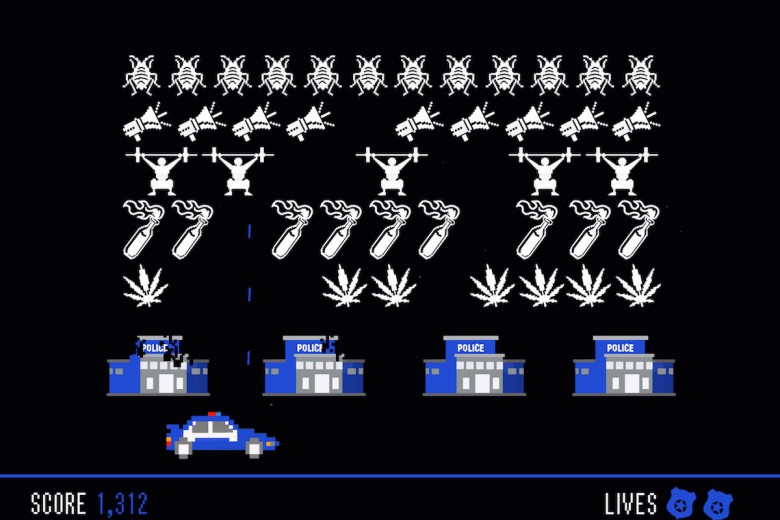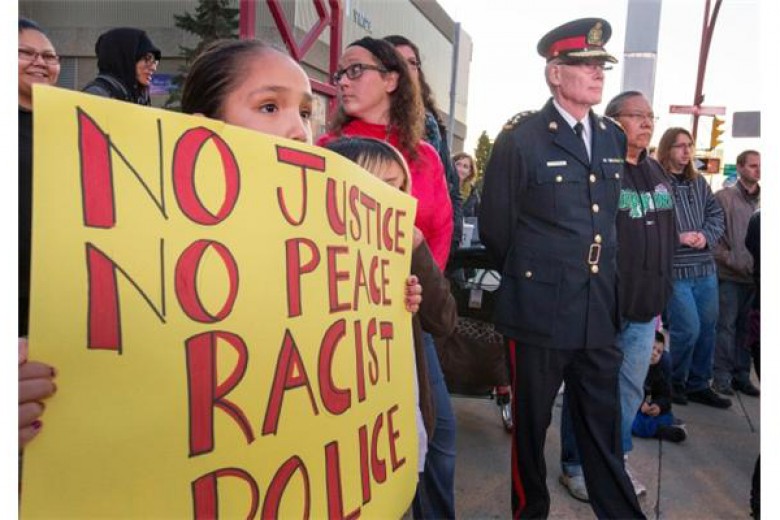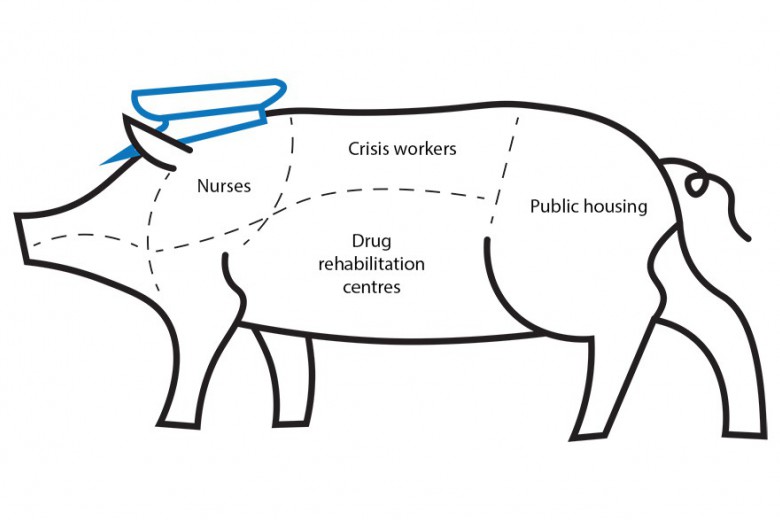On December 10, 2014, Simon Ash-Moccasin was racially targeted, physically assaulted, and denied his basic rights by Regina police officers. After a year of concerted community organizing and pressure, the Public Complaints Commission released a report in January 2016 validating Ash-Moccasin’s complaint but refusing to comment on the racial dimensions of the police attack.
Despite the commission’s clear, public findings, the officers in question have not been disciplined, no public apology has been offered, and the mayor, the board of police commissioners, and the chief of police all maintain there is no problem with racist policing in Regina.
The following interview took place in Andrew Loewen’s Regina apartment on March 13, two days before Regina’s second annual march for International Day Against Police Brutality.
* * *Andrew: It’s been well over a year since the incident in December 2014 when you were racially targeted, physically assaulted, and denied your rights by Regina police officers. A group of Regina activists and residents has been organizing on the issue and working on this pretty non-stop since then. How do you feel about how it’s gone?
Simon: Well, under the good faith agreement of our meeting with the Public Complaints Commission and the Chief and Deputy Chief of the Regina Police Service I’m not supposed to say anything about this.
A: Well, that’s not true about—
S: [laughter] Just kidding. I like starting off with that. I like to start with some humour. I think humour really helps. I think when you bring humour to those really dark experiences it means you’re healing from them.
For my people, that’s what we’ve had. Is humour. And that’s how we get through things. I feel that I’ve stepped into a bigger issue that’s gotten way out of hand, for way too long. And not that I feel like I can’t do anything about that. And not that I’m discouraged, but I went through all those emotions. I went through the anger, the sadness. But I’m feeling like it’s a good starting point, a good entry to point to fix what’s going on in this city here, in Regina. I’m going to talk about Regina specifically because it happened here.
A: The grassroots group we are in has been putting pressure on the key authorities here, on the Mayor, Michael Fougere, and especially the Chief of Police, Troy Hagen. And we’ve definitely gotten some decent media coverage: a front-page story in the “paper of record” here, local TV news coverage, and most recently your story is prominently featured in a Maclean’s magazine cover story on racist policing and Canada’s obscene Indigenous incarceration rates.
But so far we haven’t really made any concrete gains—and they won’t even acknowledge that there’s racism in the police, let alone the structural issues. Why do you think it’s been so hard to make any progress?
S: Because of privilege. And privilege keeps people safe. We’re in a government town. And the reason there’s no progress, from my standpoint, is that when there’s support to be drummed up by people, their hands are tied by their work. When I talk to them, they’re like, yeah we support what the group is doing, the grassroots justice and police accountability group, what we’re doing. There’s so much support but this is the thing: people don’t want to bite the hand that feeds them.
A: Are you speaking about Indigenous people in town?
S: There’s a lot of Indigenous and non-Indigenous people.
A: Both?
S: Yeah, both. They’re scared. Everybody’s scared to stand up to the colonizers. And I’m not. I lived through that. I saw that. Being scooped up as part of the 60s scoop, being in that family environment, being taken away from my own traditions. I was able to see how they act, how those ones are buddies. How they keep that system going. How they keep oppression going. And they’re territorial for really no reason. Well, I mean money. Money dictates a lot of it.
So we have the systemic racism here. We have that oppression happening. And so it’s hard. And plus you have the violence. You do have that police violence here. The police are the dogs out there that keep us, that keep my people, the Indigenous people, down here.
I’ve known so many that have moved away from here because they say it’s no good here. You know, there is manufactured poverty here. By those at the top and on down. And it’s got to stop. And you know, the only way to stop that is to get those stories out there.
Because there’s that fear. “What’s going to happen if I tell my story? These guys will come at me.” And you know, it sucks.
A: When you talk to people do you think they see the connection between the racism of the police and colonialism?
S: Indigenous people do—yeah. The privileged, no. Like with the Maclean’s article, they uncovered a lot of things here and still nothing moves on the issue.
And that’s because that privilege has gone on too long. I walk around in town here. I love walking. I haven’t had a car in three years. Kind of a personal choice in a way. And I’ve scaled back on how I was raised, in a white family, around money and stuff. So I understand that privileged outlook. They don’t want us to be seen. They want us—they’ll lock us up. And that’s what’s shown in the Maclean’s article.
And that article also uncovered how the privileged see the police. “Oh yeah, that’s authority.” But is it really? It’s the privileged also giving up their rights. And they don’t see that.
With the downtrodden, which are the poor, which are mostly my people out there, it’s about poverty. And it’s hard to get ahead here, when you have all these factors coming at you. And the Maclean’s article shows the different views of the police between Indigenous and non-Indigenous people.
And there’s so many things even before the police ever get involved. I mean there’s prevention but there’s the intergenerational effects of colonialism. It’s an ongoing fight. All I can see and hear lately is something like a revolution coming. Not a civil war but something. And it’s got to be with knowledge. And it’s got to be with truth. It’s intense.
The police chief here won’t even acknowledge there’ s racism and the mayor won’t meet with me. I think he’s scared. I know that Mayor Fougere was there that day we had a press conference at City Hall and I tried to deliver [the findings of the Public Complaints Commission] regarding my case and a letter asking for a meeting. He just didn’t want to come down from his office. Because he’s scared.
He’s a privileged person with all his real-estate buddies. Who do all their construction and development here in Regina. He takes care of his buddies. They stick together. And it’s also with the Downtown Regina Business Improvement District and the Chamber of Commerce. They all stick together.
A: So you see a connection between the business class and racist policing and politicians.
S: Well yeah. Just look at that Unwelcome Guests initiative that they have downtown here, that targets panhandlers and people downtown. Of course there is a connection.
And it also gets down to the educational aspect, being a teacher myself. Education is one way we can combat against that. When you come up against the system you have to have some solutions. And yeah, there’s some Treaty smarts in the schools, there’s a little bit of stuff being said out there, but there isn’t a real history being taught of what happened here.




_780_520_90_s_c1_c_b.jpg)


